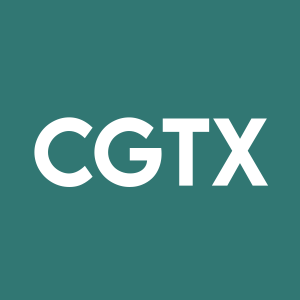Cognition Therapeutics Publishes EEG Findings from Phase 2 SEQUEL Study of CT1812 in Mild-to-Moderate Alzheimer’s Disease
Rhea-AI Summary
Cognition Therapeutics (NASDAQ: CGTX) has published results from the SEQUEL study of CT1812, their lead candidate for Alzheimer's disease treatment, in The Journal of Prevention of Alzheimer's Disease. The single-site study measured brain wave patterns in 16 adults with mild-to-moderate Alzheimer's after 29 days of treatment. CT1812-treated participants showed consistent trends of improvement across all prespecified EEG parameters, with significant changes in relative theta power and AEC-c, which assesses brain region connectivity.
The study suggests CT1812 may normalize brain wave patterns and facilitate communication between brain regions by protecting synapses as an Aβ oligomer antagonist. Treatment produced a reduction in global relative theta power across various brain regions and improved global alpha AEC-c. CT1812 was well-tolerated with mostly mild to moderate adverse events reported.
Positive
- CT1812 showed consistent trends of improvement across all prespecified EEG parameters
- Significant changes observed in relative theta power (p=0.006) and AEC-c (p=0.034)
- CT1812 may normalize brain wave patterns and improve brain region connectivity
- Treatment reduced global relative theta power across various brain regions
- CT1812 was well-tolerated with mostly mild to moderate adverse events
Negative
- Small sample size of only 16 adults in the study
- Short treatment duration of 29 days
- Some adverse events reported, including diarrhea, nausea, and hepatic enzyme elevation
News Market Reaction – CGTX
On the day this news was published, CGTX gained 1.16%, reflecting a mild positive market reaction.
Data tracked by StockTitan Argus on the day of publication.
PURCHASE, N.Y., Aug. 22, 2024 (GLOBE NEWSWIRE) -- Cognition Therapeutics, Inc., (the “Company” or “Cognition”) (NASDAQ: CGTX), a clinical stage company developing drugs that treat neurodegenerative disorders, today announced that results from the SEQUEL study of CT1812, the Company’s lead candidate for the treatment of Alzheimer’s disease, were published in The Journal of Prevention of Alzheimer's Disease. SEQUEL was a single-site study that measured brain wave patterns in 16 adults with mild-to-moderate Alzheimer’s disease following 29-days of treatment with CT1812 or placebo. In this study, CT1812-treated participants exhibited consistent trends of improvement across all prespecified electroencephalography (EEG) parameters with several reaching significance, including the change in relative theta power in the central region (p=0.006) of the brain and AEC-c* (p=0.034), which assesses the connectivity between brain regions.
"The gradual slowing of brain wave patterns and impaired connectivity that is a hallmark of Alzheimer’s disease is due to the loss of synapses, which are the connection points between neurons,” stated Anthony O. Caggiano, MD, PhD, chief medical officer and head of R&D at Cognition Therapeutics. “Quantitative qEEG is a sensitive method of measuring the electrical activity of neurons in the brain. The changes we observed across EEG parameters in SEQUEL may indicate that CT1812 is normalizing brain wave patterns and facilitating communication between different brain regions. We believe that CT1812 was able to rescue these early deficits by protecting synapses through its unique mechanism as an Aβ oligomer antagonist.”
In the SEQUEL study, treatment with once-daily oral CT1812 produced a consistent reduction in global relative theta power and in relative theta power in frontal, temporal, parietal, occipital and central brain regions. Increasing prominence of slower EEG frequencies (4-8 Hz) termed “theta” and a declining prominence of “alpha” frequencies (8-12 Hz) are associated with cognitive decline in people with Alzheimer's disease. This improvement in global and relative theta power was coupled with an observed improvement in global alpha AEC-c, a measure of connectivity between brain regions, which has been found to be highly predictive of changes in cognitive function in Alzheimer’s disease. Together, the improvement in AEC-c and the shift in brain wave from theta towards faster alpha frequencies we believe supports our thesis that CT1812 has a unique neuroprotective mechanism that may normalize synaptic function.
CT1812 was observed to be well tolerated with mild or moderate treatment emergent adverse events (TEAEs) occurring in 11 patients in the CT1812-treated arm and 6 on placebo. The six treatment-related AEs were diarrhea, nausea, and vomiting with placebo; diarrhea, nausea, and hepatic enzyme elevation with CT1812. No AEs lead to discontinuation and no severe or serious AEs or deaths were reported among CT1812-treated participants.
These results and other details of the study may be found in the open-access article in The Journal of Prevention of Alzheimer's Disease, titled “A Pilot Electroencephalography Study of the Effect of CT1812 Treatment on Synaptic Activity in Patients with Mild to Moderate Alzheimer’s Disease.” This and Cognition’s other published articles may be found on the Company’s Publication webpage.
* Note: AEC-c = corrected amplitude envelope correlation
About the SEQUEL Study
The SEQUEL study enrolled 16 adults (15 of whom completed the study) with mild-to-moderate Alzheimer’s disease (MMSE 18-26), each of whom were randomized to receive either 300mg CT1812 or placebo once daily for 29 days. After a 14-day wash-out period, participants cross over into the other treatment arm for an additional 29 days. Quantitative EEG evaluations were taken periodically throughout the duration of the trial. SEQUEL was designed to assess the safety and efficacy of CT1812 and to measure the impact of CT1812 on the electrical activity in the brain, specifically those electrical impulses in the theta band.
SEQUEL was supported by
About CT1812
CT1812 is an experimental orally delivered small molecule oligomer antagonist that penetrates the blood-brain barrier and binds selectively to the sigma-2 (σ-2) receptor complex. Preclinical and clinical data demonstrate that this binding results in the displacement of toxic Aβ oligomers. The σ-2 receptor complex is involved in the regulation of key cellular processes such as membrane trafficking and autophagy that are damaged by toxic interaction with Aβ oligomers, oxidative stress and other stressors. This damage to sensitive synapses can progress to a loss of synaptic function, which manifests as cognitive impairment and Alzheimer’s disease progression.
Participants are currently being recruited in the START study (NCT05531656) of CT1812 in adults with early Alzheimer’s disease; and the MAGNIFY study (NCT05893537) in adults with geographic atrophy (GA) secondary to dry age-related macular degeneration. Enrollment has completed in the SHIMMER study (NCT05225415) of CT1812 in adults with dementia with Lewy bodies and the aforementioned SHINE Study.
About Cognition Therapeutics, Inc.
Cognition Therapeutics, Inc. is a clinical-stage biopharmaceutical company engaged in the discovery and development of innovative, small molecule therapeutics targeting age-related degenerative disorders of the central nervous system and retina. We are currently investigating our lead candidate CT1812 in clinical programs in Alzheimer’s disease, dementia with Lewy bodies (DLB) and dry age-related macular degeneration (dry AMD). We believe CT1812 and our pipeline of σ-2 receptor modulators can regulate pathways that are impaired in these diseases. We believe that targeting the σ-2 receptor with CT1812 represents a mechanism functionally distinct from other current approaches in clinical development for the treatment of degenerative diseases. More about Cognition Therapeutics and its pipeline can be found at https://cogrx.com
Forward-Looking Statements
This press release contains forward-looking statements within the meaning of The Private Securities Litigation Reform Act of 1995. All statements contained in this press release, other than statements of historical facts or statements that relate to present facts or current conditions, including but not limited to, statements regarding our product candidates, including CT1812, and any expected or implied benefits or results, including that initial clinical results observed with respect to CT1812 will be replicated in later trials and our clinical development plans, including statements regarding our clinical studies of CT1812 and any analyses of the results therefrom, are forward-looking statements. These statements, including statements relating to the timing and expected results of our clinical trials, involve known and unknown risks, uncertainties and other important factors that may cause our actual results, performance, or achievements to be materially different from any future results, performance, or achievements expressed or implied by the forward-looking statements. In some cases, you can identify forward-looking statements by terms such as “may,” might,” “will,” “should,” “expect,” “plan,” “aim,” “seek,” “anticipate,” “could,” “intend,” “target,” “project,” “contemplate,” “believe,” “estimate,” “predict,” “forecast,” “potential” or “continue” or the negative of these terms or other similar expressions. We have based these forward-looking statements largely on our current expectations and projections about future events and financial trends that we believe may affect our business, financial condition, and results of operations. These forward-looking statements speak only as of the date of this press release and are subject to a number of risks, uncertainties and assumptions, some of which cannot be predicted or quantified and some of which are beyond our control. Factors that may cause actual results to differ materially from current expectations include, but are not limited to: our ability to successfully advance our current and future product candidates through development activities, preclinical studies and clinical trials and costs related thereto; uncertainties inherent in the results of preliminary data, pre-clinical studies and earlier-stage clinical trials being predictive of the results of early or later-stage clinical trials; the timing, scope and likelihood of regulatory filings and approvals, including regulatory approval of our product candidates; competition; our ability to secure new (and retain existing) grant funding; our ability to grow and manage growth, maintain relationships with suppliers and retain our management and key employees; changes in applicable laws or regulations; the possibility that the we may be adversely affected by other economic, business or competitive factors, including ongoing economic uncertainty; our estimates of expenses and profitability; the evolution of the markets in which we compete; our ability to implement our strategic initiatives and continue to innovate our existing products; our ability to defend our intellectual property; impacts of ongoing global and regional conflicts; the impact of the COVID-19 pandemic on our business, supply chain and labor force; and the risks and uncertainties described more fully in the “Risk Factors” section of our annual and quarterly reports filed with the Securities & Exchange Commission and are available at www.sec.gov. These risks are not exhaustive and we face both known and unknown risks. You should not rely on these forward-looking statements as predictions of future events. The events and circumstances reflected in our forward-looking statements may not be achieved or occur, and actual results could differ materially from those projected in the forward-looking statements. Moreover, we operate in a dynamic industry and economy. New risk factors and uncertainties may emerge from time to time, and it is not possible for management to predict all risk factors and uncertainties that we may face. Except as required by applicable law, we do not plan to publicly update or revise any forward-looking statements contained herein, whether as a result of any new information, future events, changed circumstances or otherwise.
| Contact Information: Cognition Therapeutics, Inc. info@cogrx.com | Casey McDonald (media) Tiberend Strategic Advisors, Inc. cmcdonald@tiberend.com | Mike Moyer (investors) LifeSci Advisors mmoyer@lifesciadvisors.com |








